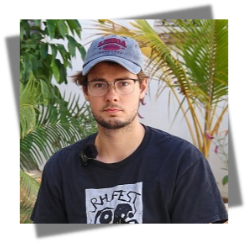COURSE OVERVIEW

Language of instruction
CASA Cuba is a language immersion program, and as such, you are required to take all of your courses in Spanish.
CASA Cuba
CASA/University Courses
| Courses/Subjects | Total courses | Total credits/hours |
|---|---|---|
| CASA Courses | 2-3 | 4 / 60 hours each |
| Direct enrollment courses | 1-2 | 2/3/4/ semester-hour credits 32/48/64 contact hours |
Examples of the courses commonly taught at the CASA Center can be found below. The courses offered at CASA are specifically designed for international students with little or no knowledge of Cuba, include site visits and invited experts that will engage with students. The format of theses classes is more akin to the US/international seminar style with debates, presentations etc.
CASA Courses Spring 2026
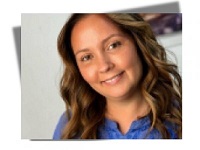 Professor: M.Sc. Tania Sevillano Hernández
Professor: M.Sc. Tania Sevillano Hernández
Master in Didactics of Spanish and Literature, “Enrique José Varona” University of Pedagogical Sciences (2011). Thesis: Workshop system for the development of oral communication in first-year students of the Spanish-Literature degree. Professor in the Department of Linguistic Studies at the University of the Arts, (ISA). Taught: Linguistic Studies, Theaterology and Dramaturgy, Theater Art Writing and Composition, Dance Art.
e-mail: taniasevillano33@gmail.com
Articles
2023: Analysis of language from the process of aestheticization of the arts in language classes. In: XXI Scientific Conference on Art and Culture 2023, III Symposium “Thought and humanities in the Arts.”
2022: The construction of professional pedagogical discourse. In the book “Manual to analyze and construct professional pedagogical discourses.” Compilation made by Alicia Toledo Costa and Oriniel Martinez Ibarra. ISBN 9789974949683, Montevideo, Uruguay.
Course Description
The course seeks to consolidate previously acquired knowledge of Spanish. It provides tools and exercises that will be useful for reading skills, discussions, presentations, research activities and the preparation of academic essays, as well as for the daily use of the Spanish language. The course helps students with their linguistic and sociocultural immersion in Cuba.
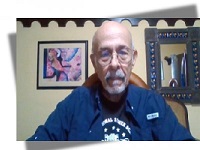 Professor Dr. Rafael Hernández Rodríguez. Political scientist, researcher, writer. He directs the journal of social sciences and cultural studies, Temas. He has been a professor at the University of Havana and the Higher Institute of International Relations; Researcher at the Center for American Studies and at the Juan Marinello Institute. He has taught as visiting professor at Harvard, Columbia, the University of Texas, the University of Puerto Rico; CIDE and ITAM in Mexico, Renmin University in China; he has also served as a visiting scholar at the Wilson Center (Washington DC) and the Institute of Developing Economies (Tokyo). He has published on Cuban and US politics, inter-American relations, international security, migration, Cuban culture, civil society.
Professor Dr. Rafael Hernández Rodríguez. Political scientist, researcher, writer. He directs the journal of social sciences and cultural studies, Temas. He has been a professor at the University of Havana and the Higher Institute of International Relations; Researcher at the Center for American Studies and at the Juan Marinello Institute. He has taught as visiting professor at Harvard, Columbia, the University of Texas, the University of Puerto Rico; CIDE and ITAM in Mexico, Renmin University in China; he has also served as a visiting scholar at the Wilson Center (Washington DC) and the Institute of Developing Economies (Tokyo). He has published on Cuban and US politics, inter-American relations, international security, migration, Cuban culture, civil society.
e-mail: rafaelmhdez@yahoo.com
Articles
"Conflict resolution" between the United States and Cuba: clarifications, premises and precautions.
In: Ritter A.R.M., Kirk J.M. (eds) Cuba in the International System. International Political Economy Series. Palgrave Macmillan, London.Cuba in the International System
The story of the future. On the 5 and odd lessons of Obama before the Cuban civil society.
The story of the future.
Cuba. For a socialism without fear
Course Description
This seminar examines the complexities of the US-Cuba conflict, which is a case study at the crossroads of North-South and East-West tensions. It focuses on its most recent developments from the Cold War to the present, on domestic and multilateral interactions, international interests and actors, as well as points of convergence and confrontation at the bilateral, regional and extra-hemispheric level. This conflict is explored as an intermestic relationship, considering the roles that both countries play in each other's internal affairs. The seminar will emphasize the case of Cuba-United States relations as a paradigm for understanding nationalism and imperialism, the limits of US power, and the dynamics of Third World revolutions. It focuses in depth on the main themes that have shaped current relations between the United States and Cuba, their different political values and national interests, ideological and cultural representations, and their current meanings; but also their “ties of singular intimacy”, cultural affinities, mutual images and civic cultures. This special relationship offers a case study to discuss how a conflict matrix also involves real and potential instances of cooperation, where creative politics can flourish and develop the current process of normalization, with all its complexities and perspectives.
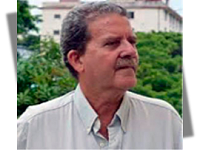 Professor: Dr. Enrique Beldarrain Chaple Medical specialist in Epidemiology. Doctor of Health Sciences. Full Professor of the Medical University of Havana, Senior Researcher. Research Coordinator of the National Information Center for Medical Sciences. Academician of the Academy of Sciences of Cuba. He has published 5 books and 72 scientific articles.
Professor: Dr. Enrique Beldarrain Chaple Medical specialist in Epidemiology. Doctor of Health Sciences. Full Professor of the Medical University of Havana, Senior Researcher. Research Coordinator of the National Information Center for Medical Sciences. Academician of the Academy of Sciences of Cuba. He has published 5 books and 72 scientific articles.
e-mail: ebch@infomed.sld.cu
Articles
First historical epidemiological approach to COVID-19 in Cuba. Annals of the Academy of Sciences of Cuba; Vol. 10, No. 2 (2020): special COVID-19.
The COVID-19 pandemic, case studies: Australia, New Zealand and Cuba.
Course Description
The course takes an initial historical tour of Cuban medicine and the development of health institutions and their relationship with society at each historical moment. Its chronology stretches to the present day, where it analyzes the impact of the COVID-19 pandemic in Cuba, the multidisciplinary response designed to face it, the role of science in that response, biotechnology, social behavior and the influence of the disease in all aspects of contemporary life.
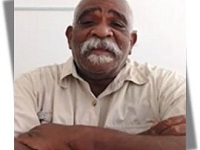 Professor Lic. Víctor Fowler Calzada
Professor Lic. Víctor Fowler Calzada
Poet, essayist, critic, narrator. He received the National Award for Criticism in 1998 with his book "The curse." He is a frequent commentator on race relations in Cuba in national and international media. His research interests cover the history of Cuban literature, as well the problems of gender, race and sexual identity in said literature. He has won several national awards as a poet. He is currently working on a volume of essays about projects of social transformation in Cuba from the end of the nineteenth century to the present. He is a member of the Cuban Association of Cinematographic Art.
e-mail: oppianos@gmail.com
Articles
Discriminations: Terms to discuss and tools for action
La Jiribilla.cu
An exercise in auto-ethnography.
La Jiribilla, ejercicio de auto etnografia
University of Havana Courses
➢ After selecting CASA courses, students choose from an extensive course offering at the University of Havana. Please consult the following documents for typical course offers. Bear in mind that there may be adaptations (more or different courses) from one year to another. If you would like to see previous Fall 2025 courses offerings from the Departments of Economics, Psychology, Journalism, Geography, or Journalism, please email Emily at
emily@lahabana.casa.education
➢ As the UH does not post its current course offering online, you need to refer to courses from a previous academic year, making sure that you select courses offered during the relevant semester. Most courses repeat each academic year, but may be taught by different professors.
Artes y Letras Course Catalog, Fall 2025
Filosofía, Historia, Sociología Course Catalog 2025-2026
➢ There will be a number of innovative, elective courses that vary from semester to semester, but they only become available and are confirmed once the semester starts.
➢ Please bear in mind that this is not an exhaustive list of courses, but rather an example of courses that have been offered in past semesters.
➢ Courses may be limited in space availability and/or may require prerequisites; therefore, you should compile a preliminary list of at least five UH courses that can be narrowed down to a final course load of one or two courses and 6-8 full academic credits.
➢ Final course selection and enrollment will take place two weeks after your classes start.
➢ You should refrain from taking online classes as part of your coursework in order to align with CASA Cuba’s immersive nature and program objectives. There are no local online classes.
➢ It is essential for you to have your course selection approved by your home school academic advisor to ensure that credit will be awarded for your chosen courses.
